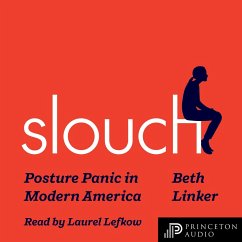
The Apothecary's Wife (MP3-Download)
The Hidden History of Medicine and How It Became a Commodity Ungekürzte Lesung. 506 Min.
Sprecher: Handshaw, Rachel
Versandkostenfrei!
Sofort per Download lieferbar
14,99 €
inkl. MwSt.
Weitere Ausgaben:

PAYBACK Punkte
7 °P sammeln!
Bloomsbury presents The Apothecary's Wife by Karen Bloom Gevirtz, read by Rachel Handshaw. The running joke in Europe for centuries was that anyone in a hurry to die should call the doctor. As far back as ancient Greece, physicians were notorious for administering painful and often fatal treatments – and charging for the privilege. For the most effective treatment, the ill and injured went to the women in their lives. This system lasted hundreds of years. It was gone in less than a century. Contrary to the familiar story, medication did not improve during the Scientific Revolution. Yet someh...
Bloomsbury presents The Apothecary's Wife by Karen Bloom Gevirtz, read by Rachel Handshaw. The running joke in Europe for centuries was that anyone in a hurry to die should call the doctor. As far back as ancient Greece, physicians were notorious for administering painful and often fatal treatments – and charging for the privilege. For the most effective treatment, the ill and injured went to the women in their lives. This system lasted hundreds of years. It was gone in less than a century. Contrary to the familiar story, medication did not improve during the Scientific Revolution. Yet somehow, between 1650 and 1740, the domestic female and the physician switched places in the cultural consciousness: she became the ineffective, potentially dangerous quack, he the knowledgeable, trustworthy expert. The professionals normalized the idea of paying them for what people already got at home without charge, laying the foundation for Big Pharma and today's global for-profit medication system. A revelatory history of medicine, The Apothecary's Wife challenges the myths of the triumph of science and instead uncovers the fascinating truth. Drawing on a vast body of archival material, Karen Bloom Gevirtz depicts the extraordinary cast of characters who brought about this transformation. She also explores domestic medicine's values in responses to modern health crises, such as the eradication of smallpox, and what benefits we can learn from these events.
Dieser Download kann aus rechtlichen Gründen nur mit Rechnungsadresse in A, D ausgeliefert werden.













